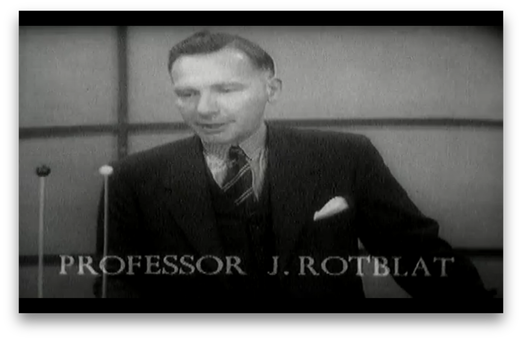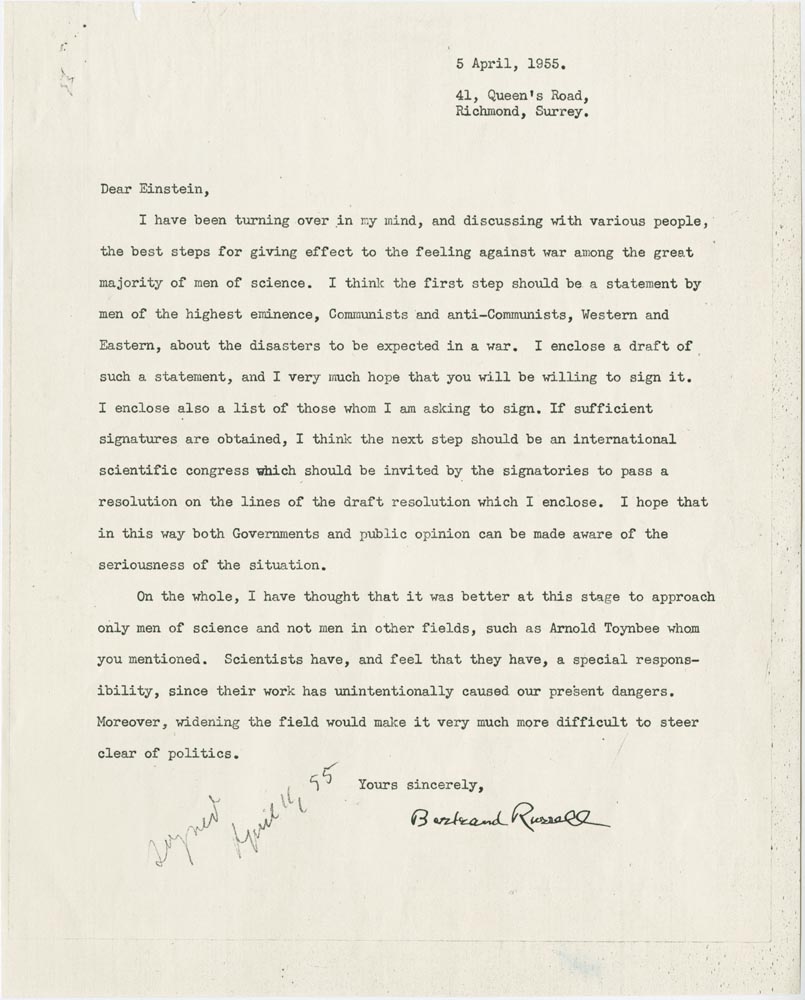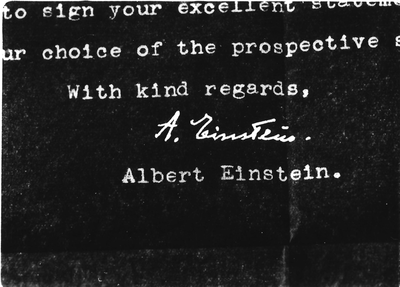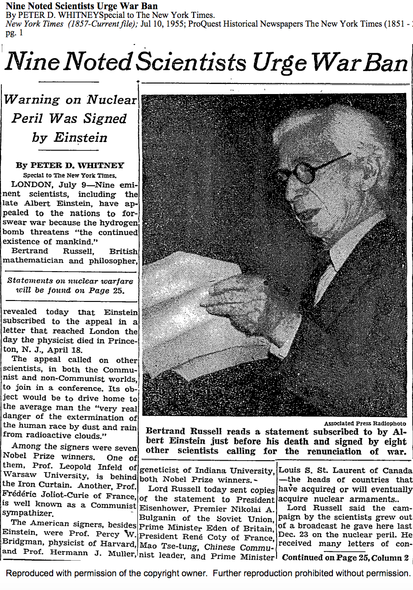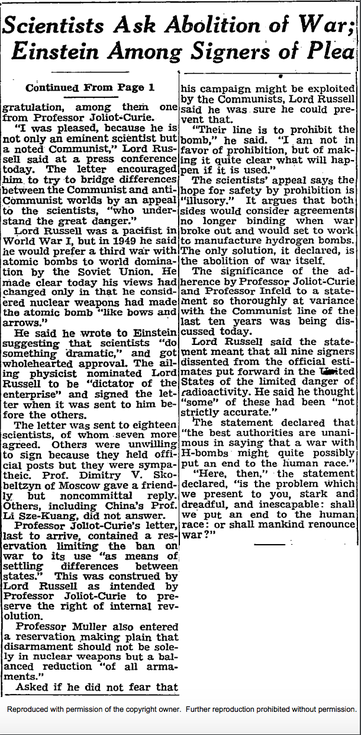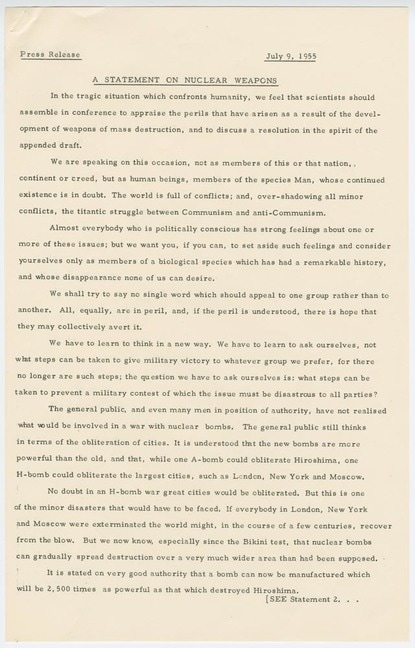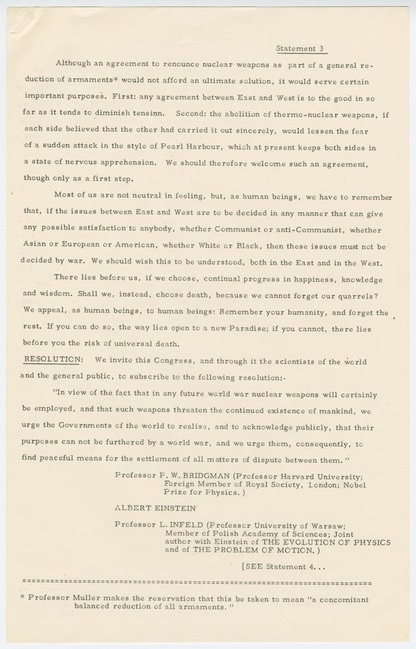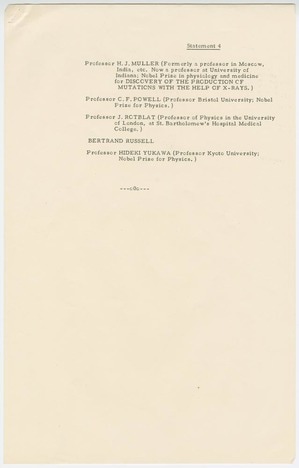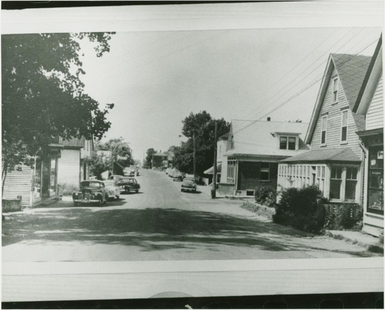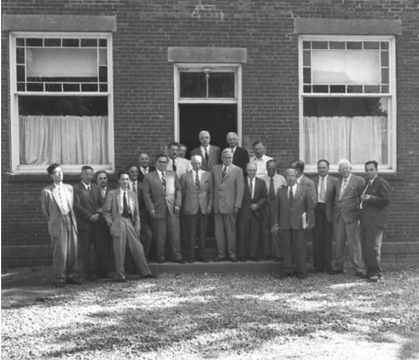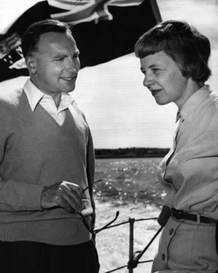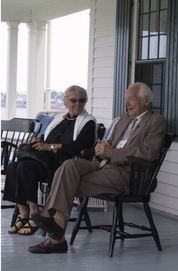"Map pinpointing Pugwash, Nova Scotia from various locations in the world"
(McMaster University Library)
(McMaster University Library)
TAKING A STAND AGAINST NUCLEAR WARFARE: THE ASSEMBLAGE OF PUGWASH
The Lucky Dragon
|
On March 1, 1954, a U.S. hydrogen bomb (H-bomb) was detonated at Bikini Atoll, exposing fisherman on the nearby Japanese boat, Daigo Fukuryu Maru (Lucky Dragon No. 5), to radioactive fallout.
|
"They were outdoors, on this little boat when the bomb went off. Several hours later, the radioactive debris of a chalky nature—the coral was made of chalk. This drifted down and descended on the decks of the Lucky Dragon. The men took it off their shoulders and off their heads. They were very lucky; the Lucky Dragon had a good name. They were very lucky because if the bomb had been bigger, there would have been more radioactivity and it would have killed them. As it was, it did not. Only one man died, and I think he died of a blood disease." |
bbc and bertrand russell
|
Rotblat discussing his Panorama appearance after the detonation of the hydrogen bomb
(the British Library) Bertrand Russell, a British mathematician and philosopher, was on Panorama with Rotblat, and they passionately discussed the impact of nuclear weapons. Both believed nuclear weapons were a severe danger to mankind. Rotblat became essential to executing Russell’s vision of a conference of scientists to discuss nuclear warfare.
|
"Rotblat's appearance on Panorama, 1954"
(The Strangest Dream) |
The Russell-Einstein Manifesto
Russell created a declaration that proposed the gathering of scientists to discuss nuclear warfare and efforts to eliminate it. The scientists would be asked to set aside their political backgrounds and unite “as members of a biological species which has had a remarkable history, and whose disappearance none of us can desire.” This text, endorsed by Albert Einstein in a letter two days before his death, was titled the Russell-Einstein Manifesto. It was announced in London’s Caxton Hall at a public meeting chaired by Rotblat, a signer of the document.
|
Bertrand Russell's letter to Albert Einstein
(McMaster University Libraries) |
"To those of us in Chicago [the Manifesto] was like finding a crack in the Iron Curtain. Especially to me, and to many of those in my generation in that setting, it gave meaning and set a principled direction that we could follow with enthusiasm." Einstein's letter of endorsement
(Pugwash Conferences on Science and World Affairs) |
|
Russell-Einstein Manifesto announcement in Caxton Hall
(Archive, Pugwash Conferences) |
Bertrand Russell presenting the Russell-Einstein Manifesto
(McMaster University Libraries) |
Notice alerting the public of the Manifesto
(Foreign Policy in Focus) |
(McMaster University Libraries)
|
(Click to enlarge.)
The World Conference of Scientists in London where Bertrand Russell once again presented his idea of a conference of scientists
(McMaster University Library Digi)
(McMaster University Library Digi)
(Click to enlarge.)
The Russell-Einstein Manifesto (1955)
(McMaster University Libraries)
(McMaster University Libraries)
Rotblat co-founds the Pugwash Conferences on Science and World Affairs
|
Canadian industrialist and financier, Cyrus Eaton, financed the conference of scientists, requesting that the first one be in his birth village, Pugwash, Nova Scotia.
Twenty-two delegates attended the first Pugwash Conference representing countries such as the U.S., the Soviet Union, and China. During the four-day meeting, participants discussed radiation hazards, international control of nuclear weapons, and the social responsibility of scientists. At the Conference’s end, Rotblat read three reports to the press and sent copies to leaders of countries with nuclear weaponry. Pugwash, Nova Scotia (1957)
(McMaster University Libraries) |
"1st Pugwash Conference, Pugwash, Nova Scotia, July 1957."
(Joseph Rotblat: A Visionary for Peace) |
